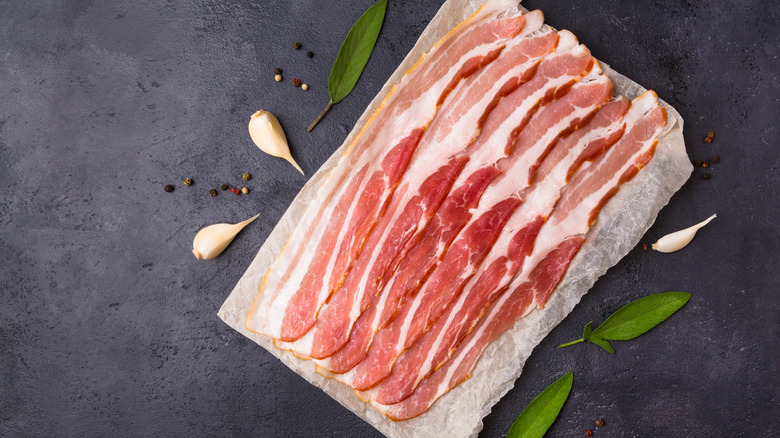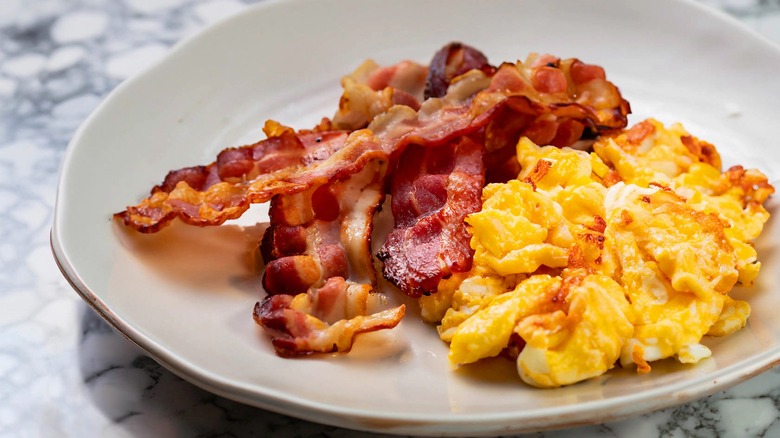The Unsettling Reason Your Packaged Bacon Is Rosy Pink
Most people know that bacon tastes good with everything, but few ever question where it gets its bright, rosy color. Unfortunately, like many delicious things, this hunger-inducing hue comes from the use of additives, which can have some seriously negative effects on your health.
In 2015, the World Health Organization published findings that labeled bacon and other processed meats as Group 1 carcinogens, placing the pork product alongside known cancer-causers like tobacco. Based on the advice of 22 experts and over 400 studies, these findings shocked bacon lovers worldwide.
However, the most surprising thing isn't that bacon is linked to health issues; it's why there is a correlation in the first place. On its own, bacon is hardly the worst thing you could eat, and there are ways to make it less carcinogenic. The real issue stems from the nitrates that give bacon and other meats their signature pink color.
Bacon's compelling color is the result of harmful additives
When you think of bacon, you probably picture pink slices of meat laced with lines of rich white fat. However, this pink color indicates that the meat has been treated with chemicals, most commonly potassium nitrate and sodium nitrite. These chemicals are used to cure the meat and give it the distinct color we're all familiar with.
Potassium nitrate, also called saltpeter, is a naturally occurring mineral that has been used to cure meat since the 1800s (per Canadian Organic Grower). Likewise, sodium nitrate is an inorganic compound used to speed up the curing process in meat manufacturing. This chemical started being used alongside potassium nitrate in the early 20th century to increase production.
It's important to note that these additives aren't carcinogenic on their own and that the danger comes from their direct use in meat processing. When these nitrates interact with compounds like amines, amides, and heme iron in meat, they create N-nitroso compounds, such as nitrosamines, which are carcinogenic. So, every time someone eats bacon, they are exposing themselves to these harmful compounds, which can damage cells throughout the body and may eventually lead to cancer.
Surprisingly enough, scientists knew about these effects long before the WHO announcement in 2015, with Leo Freedman of the U.S. Food and Drug Administration admitting as much to the New York Times in 1973. However, the meat industry quickly hit back, stating that the additives were for consumer safety.
What to do if you love bacon but hate additives
If you're worried about nitrates in your bacon, your first thought might be to switch to an uncured bacon brand. However, uncured bacon isn't really uncured; instead, it uses nitrates from natural sources, such as celery. Unfortunately, this still creates N-nitroso compounds as it interacts with meat, making it no safer than synthetic alternatives (via Foods).
That said, nitrate-free bacon does exist. One such brand is Finnebrogue's Naked Bacon, which launched in 2018. It isn't cured; instead, it is salted pork injected with an extract made from fruits and vegetables. While this makes it more perishable, the difference is negligible as long as it remains refrigerated. While nitrate-free bacon has yet to become mainstream, other smaller specialty producers have started selling bacon without nitrates from artificial and natural sources. You may also find nitrate-free bacon at your local butcher shop. Still, you should always check your labels, since even brands that claim to have no added nitrates will have wording on the packaging stating there are "natural" nitrates from celery.
Of course, nitrate-free bacon remains a niche market, largely because it's such a staple ingredient across much of the world, and manufacturers likely don't want to change their curing methods. However, if you're not keen on cutting this smoky processed meat out of your diet completely, you should know the best way to cook bacon and enjoy it in moderation.


